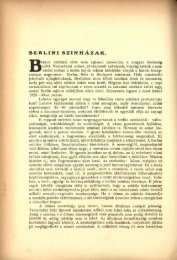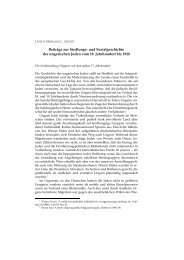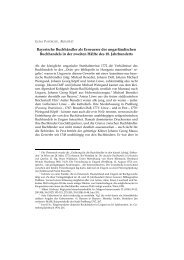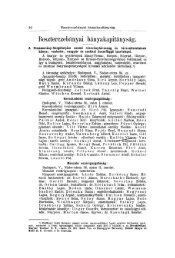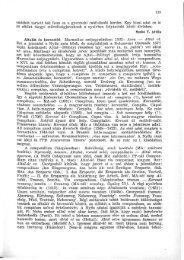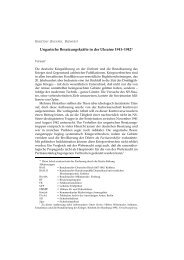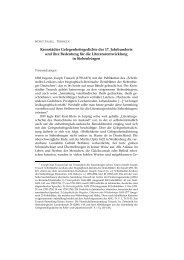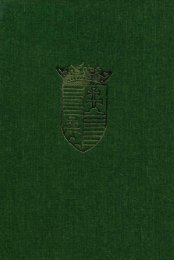hungarian studies - EPA - Országos Széchényi Könyvtár
hungarian studies - EPA - Országos Széchényi Könyvtár
hungarian studies - EPA - Országos Széchényi Könyvtár
Create successful ePaper yourself
Turn your PDF publications into a flip-book with our unique Google optimized e-Paper software.
74 ANIKÓ SOHÁR<br />
the vizier. Consequently he falls straight into the trap of a magician, who demands<br />
that he, along with three companions, go to the Haunted Region and get the Goddess<br />
Orwella's dagger from the witch who rules there. The companions are a<br />
priest, a half-elf necromancer, and a beautiful female thief, who also owes a favour<br />
to the magician. On their journey they are followed by a professional assassin<br />
sent by the deceased vizier's first concubine, face perils and temptations, and<br />
enter into various relationships with one another. For instance, Tier Nan Gorduin<br />
and the thief Eriel become lovers. The narration shifts back and forth between the<br />
four adventurers' and the assassin's stories. Reaching their destination, the adventurers<br />
succeed in disposing of the witch, her lover, the dagger, as well as the priest<br />
who turns out to be the magician himself in disguise and an ancient enemy of the<br />
witch's undead partner, whose real goal was simply revenge for his murder. The<br />
story ends with Eriel's desertion and the first steps of a tentative friendship between<br />
the hero and the necromancer.<br />
Since the M.A.G.U.S. series and the linked role-playing games have gradually<br />
evolved from a single novel (the first version of Blood Season), there are certain<br />
chronological, historical, and ideological contradictions in the texts. For instance,<br />
at the end of Csepp és tenger, the publisher adds a note in which "Mr. Chapman"<br />
is reproached for his liberalism concerning historical dates. More importantly,<br />
Tier Nan Gorduin, who was a rather 'ordinary' fantasy hero in the beginning, has<br />
been turned into a supernatural being in human flesh. His transformation is by no<br />
means extraordinary. All Chapman heroes seem to have 'gained' additional positive<br />
or superhuman characteristics in the later editions or novels. For example, in<br />
Csepp és tenger Tier Nan Gorduin gives an unsuspecting goblin an elixir that will<br />
considerably extend his life. This goblin was just a spy, though a highly successful<br />
one, in Banners of Flame.<br />
It also seems to be characteristic of the Chapman novels that the happy ending<br />
is always impaired in the same way. In Blood Season a love affair comes to an<br />
abrupt end. In Two Moons the woman abandons her partner and leaves behind<br />
only a farewell letter. While in Banners the man turns out to be a spy and a most<br />
hateful enemy, who must thus be killed by his lover. Whereas the ending of Carnival<br />
is exactly the opposite: Tier Nan Gorduin's lover proves to be a traitor, and<br />
she must thus die by his hand.<br />
The message of these works would seem to be that life is nothing but continuous<br />
struggle, where only temporary victories can be achieved. No values or principles<br />
are lasting, and therefore they do not deserve appreciation. In fact, there is<br />
no essential difference between right and wrong. This relativistic attitude is also<br />
reflected in the cyclical and deterministic history of the fantasy world. Empires<br />
and religions rise and fall without leaving any lasting change or mark on the course<br />
of human history, which is simply divided into nine eras. Some unknown creator<br />
determines the beginning and end of each age. The only constant factor is the


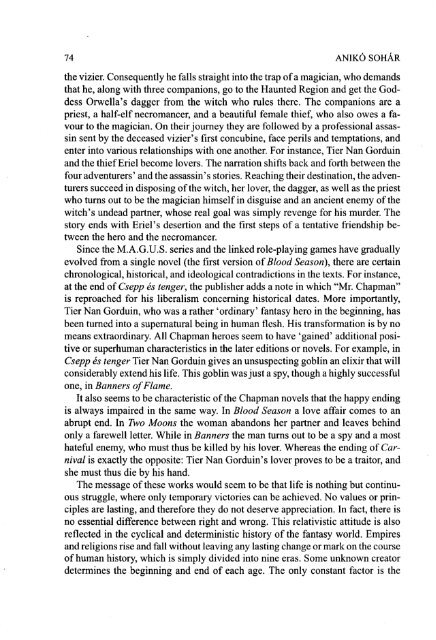
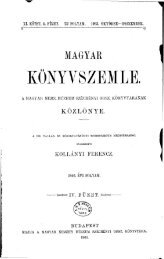
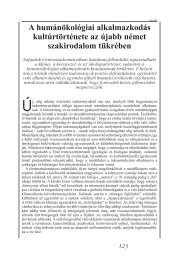
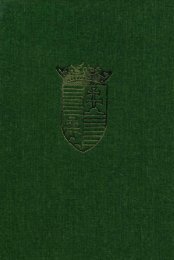
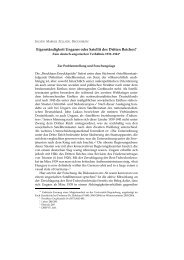
![Letöltés egy fájlban [36.8 MB - PDF] - EPA](https://img.yumpu.com/23369116/1/172x260/letoltes-egy-fajlban-368-mb-pdf-epa.jpg?quality=85)
